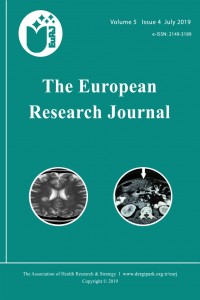Abstract
Traumatic brain injury is a clinical situation that
generally affects young people aged 45 years or younger and causes mortality
and critical functional losses. The most common psychiatric disorder following taumatic
brain injury is depression. Although the relationship between depression and
organic diseases has been studied a lot, there is less data about mania.
Secondary mania differs from primary mania with advanced beginning age, absence
of family history, more difficult and slower response to treatment; and
secondary mania usually has no recurrence. In this report, secondary mania and
its clinical features are discussed in light of a mood disorder following a
trauma case. The case is still followed with mood stabilizer treatment and the
patient is euthymic.
Keywords
References
- [1] Mortensen PB, Mors O, Frydenberg M, Ewald H. Head injury as a risk factor for bipolar affective disorder. J Affect Disord 2003;76:79-83.
- [2] Rutherford GW, Wlodarczyk RC. Distant sequelae of traumatic brain injury: premature mortality and intracranial neoplasms. J Head Trauma Rehabil 2009;24:468-74.
- [3] Bhalerao SU, Geurtjens C, Thomas GR, Kitamura CR, Zhou C, Marlborough M. Understanding the neuropsychiatric consequences associated with significant traumatic brain injury. Brain Inj 2013;27:767-74.
- [4] Zgaljardic DJ, Seale GS, Schaefer LA, Temple RO, Foreman J, Elliott TR. Psychiatric disease and post-acute traumatic brain injury. J Neurotrauma 2015;32:1911-25.
- [5] Starkstein SE, Boston JD, Robinson RG. Mechanisms of mania after brain injury. 12 case reports and review of the literature. J Nerv Ment Dis 1988;176:87-100.
- [6] Jorge RE, Robinson RG, Starkstein SE, Arndt SV, Forrester AW, Geisler FH. Secondary mania following traumatic brain injury. Am J Psychiatry 1993;150:916-21.
- [7] Starkstein SE, Pearlson GD, Boston J, Robinson RG. Mania after brain injury. A controlled study of causative factors. Arch Neurol 1987;44:1069-73.
- [8] Mendez MF. Mania in neurologic disorders. Curr Psychiatry Rep 2000;2:440-5.
- [9] Shukla S, Cook BL, Hoff AL, Aronson TA. Failure to detect organic factors in mania. J Affect Disord 1988;15:17-20.
- [10] David AFS, Kopelman MD. Lishman’s Organic Psychiatry: A Textbook of Neuropsychiatry. 4th edition ed. UK: Wiley-Blackwell; 2009.
Abstract
References
- [1] Mortensen PB, Mors O, Frydenberg M, Ewald H. Head injury as a risk factor for bipolar affective disorder. J Affect Disord 2003;76:79-83.
- [2] Rutherford GW, Wlodarczyk RC. Distant sequelae of traumatic brain injury: premature mortality and intracranial neoplasms. J Head Trauma Rehabil 2009;24:468-74.
- [3] Bhalerao SU, Geurtjens C, Thomas GR, Kitamura CR, Zhou C, Marlborough M. Understanding the neuropsychiatric consequences associated with significant traumatic brain injury. Brain Inj 2013;27:767-74.
- [4] Zgaljardic DJ, Seale GS, Schaefer LA, Temple RO, Foreman J, Elliott TR. Psychiatric disease and post-acute traumatic brain injury. J Neurotrauma 2015;32:1911-25.
- [5] Starkstein SE, Boston JD, Robinson RG. Mechanisms of mania after brain injury. 12 case reports and review of the literature. J Nerv Ment Dis 1988;176:87-100.
- [6] Jorge RE, Robinson RG, Starkstein SE, Arndt SV, Forrester AW, Geisler FH. Secondary mania following traumatic brain injury. Am J Psychiatry 1993;150:916-21.
- [7] Starkstein SE, Pearlson GD, Boston J, Robinson RG. Mania after brain injury. A controlled study of causative factors. Arch Neurol 1987;44:1069-73.
- [8] Mendez MF. Mania in neurologic disorders. Curr Psychiatry Rep 2000;2:440-5.
- [9] Shukla S, Cook BL, Hoff AL, Aronson TA. Failure to detect organic factors in mania. J Affect Disord 1988;15:17-20.
- [10] David AFS, Kopelman MD. Lishman’s Organic Psychiatry: A Textbook of Neuropsychiatry. 4th edition ed. UK: Wiley-Blackwell; 2009.
Details
| Primary Language | English |
|---|---|
| Subjects | Health Care Administration |
| Journal Section | Case Reports |
| Authors | |
| Publication Date | July 4, 2019 |
| Submission Date | June 17, 2018 |
| Acceptance Date | September 6, 2018 |
| Published in Issue | Year 2019 Volume: 5 Issue: 4 |
Cited By
Mania Following Traumatic Brain Injury: A Systematic Review
The Journal of Neuropsychiatry and Clinical Neurosciences
https://doi.org/10.1176/appi.neuropsych.20220105


